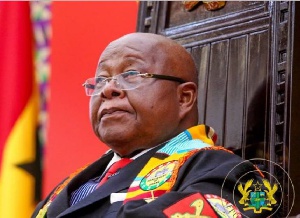 Prof Mike Oquaye is the current Speaker of Parliament
Prof Mike Oquaye is the current Speaker of Parliament
Perception has often been considered as the most primitive form of the human representational mind, which may be true. Consequently, many people attach little or no substance to issues once they are labelled as ‘perception’.
But one other thing which may also be true is that, perception is instrumental in the final registration and overall processing of information.
For instance, when a sizeable number of the people (in this case Ghanaians) say their parliament is not living up to their expectation, is that mere perception? What about the claim all over that, for four long years, as many as nineteen MPs in the sixth parliament never uttered a word on the floor of House? Must it be brushed aside as not tangible enough because it is mere perception? Again, is it a perception or a fact that today absenteeism in Parliament has become the norm and no longer the exception?
The above questions have become relevant in the face of recent and ongoing developments by members of the House.
One cannot run away from the fact that the integrity of Ghana’s Parliament has become a bigger issue of media attention after popular politician and maverick MP for Assin Central, Kennedy Agyapong, was summoned before the Privileges Committee for referring to the Parliament of Ghana as “useless and cheap”.
Even more worrying for the House was when the same MP is quoted as saying: “I have said, I am not afraid of anybody. I have heard them say they want to remove me from parliament. Me? I am ready to leave parliament. Is it parliament that feeds me?
It is, therefore not surprising that an online Poll instituted over the weekend by award-winning Ghanaian journalist, Manasseh Azure Awuni shows that a growing number of Ghanaians are losing confidence in Ghana’s Parliament.
The Poll, which ran for 24 hours on social media platform, Facebook, asked respondents to vote on whether the law-making body is useful or not.
In all, 3,609 Facebook users participated in the Poll. While 22% (795) of the respondents think Ghana’s Parliament is useful, a large majority of the respondents – 78% (2814) think otherwise.
As would also be recalled, other well-meaning Ghanaians have also had cause to question the usefulness of Ghana’s Parliament in the past. For instance, in 2016, Constitutional law expert, Prof Henry Kwesi Prempeh noted, “we don’t have a Parliament; we have two Branches of the Executive, one proposing laws and taxes and loans; the other dutifully approving them”.
Many more similar instances can be cited, but for as long as the Parliament of Ghana is seen to be sustaining the country’s democratic process, one may be tempted to conclude that all is well. After all didn’t Voltaire say that “In the eyes of the people, the general who wins a battle has made no mistakes”?
But the way one looks at the development, THE PUBLISHER is of the view that negative perception, if allowed to linger on, can metamorphose into reality.
The paper thinks that somebody somewhere needs to do something quickly to wipe away those negative perceptions. And which better way there is to do that, than from inside the Legislature itself?
We cannot play the ostrich and pretend all is well.